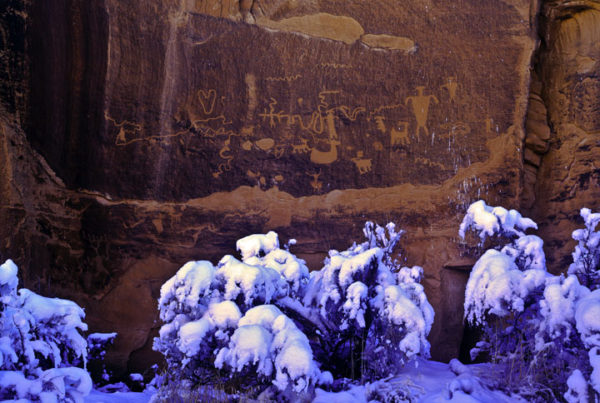The following is the second part of a presentation given by Jared Meek, ecologist and poet, at the Mormon Scholars in the Humanities 2019 annual conference. The theme of the conference was “Ecologies.” Part one can be found here.
What and Why is Dominion?
The prevailing Creation story of Christianity – in which God establishes a physical material world, populates it with plants and animals, and then gives Adam and Eve dominion over them – is another source of contention between the human and natural worlds. According to White, God granting Adam and Eve dominion over all other life on Earth explicitly communicates that “no item in the physical creation had any purpose save to serve man’s purposes.” Once again, scriptures and teachings unique to Latter-day Saint theology complicate this widely accepted Christian paradigm.
Nearly thirty years ago, Hugh Nibley clarified the origins and proper interpretation of this concept in an essay titled “Subduing the Earth: Man’s Dominion,” which should be required reading in every Latter-day Saint seminary class, institute, and Sunday School. Nibley explained that,
“Adam’s dominion was nothing less than the priesthood, the power to act for God and in His place. The idea is that God, while retaining His unshakable throne in the heavens, extended His glory to a new world below in the work of the Creation … with the understanding that “from this time forth man must work to improve the earth and preserve and take care of all that is in it, exactly as God had done before.”
The same sentiment was given by Brigham Young, who provided further evidence that the restoration of the Priesthood was also a restoration of humankind’s proper relationship with God’s creations, teaching that, “The Spirit of the Lord and the keys of the priesthood hold power over all animated beings.”
A revelation received by Joseph Smith in 1839 further clarifies Latter-day Saint beliefs about the priesthood-dominion connection. Speaking about human nature, God told Joseph Smith that,
“… the rights of the priesthood are inseparably connected with the powers of heaven, and […] the powers of heaven cannot be controlled nor handled only upon the principles of righteousness … We have learned by sad experience that it is the nature and disposition of almost all men, as soon as they get a little authority, as they suppose, they will immediately begin to exercise unrighteous dominion” (D&C 121:34-36, 39).
Were Adam and Eve, and by extension all humanity, given “dominion” over the natural world? Yes, but not unrighteous dominion. While this scripture is given in reference to human vs. human misconduct, the connections between the Priesthood and God’s creations allow it to be extended onto a human vs. nature context as well. By providing this clarification, Latter-day Saint doctrine teaches that by giving Adam and Eve “dominion”, God was entrusting humanity with the power to care for all of His creations, both human and non-human, with the promise that they would lose this divinely appointed gift if they misused it.
But why entrust humans with such power in the first place? Quite distinct from mainstream Christian doctrine, Latter-day Saints believe that they are preparing to become like God, to know what He knows, to love as He loves, and to inherit all that He has. Why entrust humankind with such a monumental task – to watch over all life on Earth – if not to prepare them for even greater responsibilities in the life hereafter? Without a belief in the eventual exaltation of the human species, the eternal why of dominion has no answer.

An Eternal Perspective
Although Adam and Eve were given this “dominion,” they were not immune to disobeying the laws of God. Christianity traces the downfall of humankind to Adam and Eve’s transgression (the “original sin”) in the Garden of Eden, an event that is depicted in a negative light in many Christian traditions. Lynn White explains that western Christianity views sin as a “moral evil, and that salvation [is] to be found in right conduct,” or through physical and spiritual acts of repentance. While LDS doctrine agrees with the necessity of repentance to return to God’s presence, it is unique among Christian denominations in its optimistic interpretation of Adam and Eve’s transgression.
The Book of Mormon famously teaches that without this transgression, Adam and Eve “would have had no children, wherefore they would have remained in a state of innocence, having no joy … Adam fell that men might be; and men are, that they might have joy” (2 Nephi 2:23, 25). Though this teaching is more specifically anthropocentric than those discussed above, Latter-day Saint beliefs concerning Adam and Eve’s ultimate motivation for transgressing God’s law guides us to an appropriate concern for the generations that will come after us, and by extension the world they will inherit. The Pearl of Great Price is again instructive:
“And in that day Adam blessed God and was filled, and began to prophesy concerning all the families of the earth, saying: Blessed be the name of God, for because of my transgression my eyes are opened, and in this life I shall have joy, and again in the flesh I shall see God.
And Eve, his wife, heard all these things and was glad, saying: Were it not for our transgression we never should have had seed, and never should have known good and evil, and the joy of our redemption, and the eternal life which God giveth unto all the obedient” (Moses 5: 10-11).
Adam and Eve’s transgression was ultimately motivated by a selfless concern for all of humanity. They were thinking of their future generations when they made the ultimate sacrifice: foregoing immortality in the Garden of Eden for a mortal life of physical and spiritual pain. An LDS understanding of this selfless act demands self-reflection: what sacrifices are we in the modern world willing to make for the family of Adam and Eve, for our future generations and the world they will inherit?
Additionally, concern for our future generations is implicit in the LDS practice of temple worship. By participating in temple and family history work, members of The Church of Jesus Christ of Latter-day Saints are constantly reminded of the importance of “turning the hearts of the fathers to the children, and the hearts of the children to the fathers, that the whole earth may not be smitten with a curse…” (D&C 27:9). This curse is evidenced by many contemporary problems, not least of which are the curses of climate change, biodiversity loss, and environmental pollution. Through our collective inaction on the climate and biodiversity crises plaguing the Earth, we are forgetting to turn our hearts to the children who will inherit our degraded world.





2 Comments